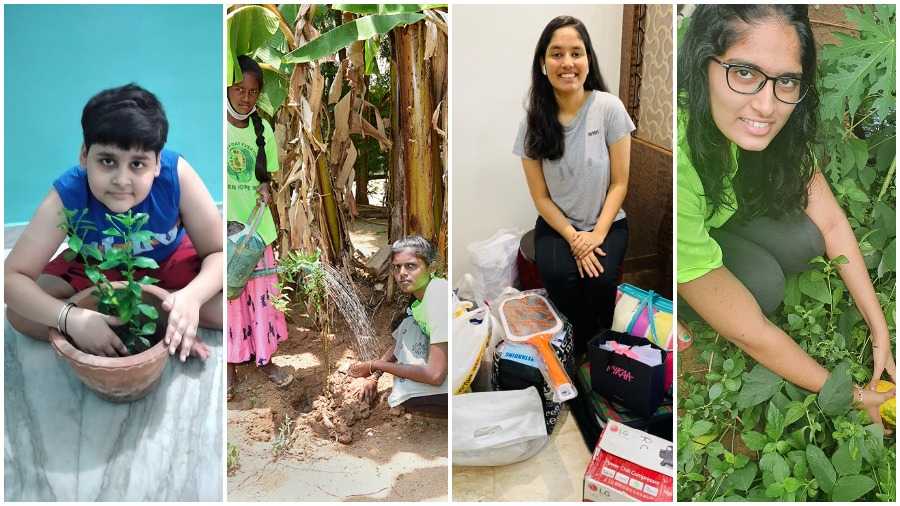Climate crusaders, friends of earth, justice seekers, environment lovers — they go by different names but their end goal is the same. The new normal has made them more aware of the need to re-group and work at reducing carbon footprints. The virtual world has brought them closer to international communities of green activists and motivated them to use their spare time to educate others and work on outlooks.
Recently at a conclave — The Climate Connection — organised by the British Council as a prologue to the UN climate change conference (COP26) in November, the speakers also stressed on the need for students to play a more active role in problem-solving and dialogues.
Speaking to a global audience from a virtual platform, Rishika Das Roy, an urban policy and resilience consultant at Oxford Policy Management — India, had said, “Adults are still stuck in the controversy between climate science and climate politics. However, children see it just as a challenge and often come up with better solutions.”
The general consensus was that consumer habits have to change and children should spearhead this.
Slowly and steadily, climate talks are not just part of nature club fests and Model United Nations in schools any more. Children are reading up on related global issues and finding solutions in their small ways. Many are volunteering with international organisations or have formed their own network to spread awareness on climate change.
A Class VI student of Birla High School, Aniket Sharma is no stranger to terms such as sustainability and recycling. “I call myself an environment-lover. I use jute bags instead of plastic ones to lead an eco-friendly life. I try to avoid paper waste and always use both sides of A4 sheets. I also look after the greens in my balcony, planting as many as possible and tending to them,” says Aniket, who is looking forward to attending climate campaigns in future.
Climate consciousness is the new cool among students in India, with international role models like Greta Thunberg showing them the way. Canadian-Indian student Kehkashan Basu is no less an idol for her hundreds of followers in India. The Bengali girl with roots in Calcutta was only 13 when she became the youngest global co-ordinator of the youth wing of the United Nations Environment Programme. Today, the fourth-year student of the University of Toronto in Canada, is an active UN rights champion and the recipient of the 2016 International Children’s Peace Prize.



Kehkashan’s NGO, Green Hope Foundation, has branches in 25 countries, including India. Managed mostly by student volunteers, it has been responsible in giving many a goal in the country. “We have worked with local youth in the Sunderbans as well as in the villages of western and southern India. Student volunteers have educated the local population and helped several villages set up solar lighting and plant more trees. We also work all over India and Bangladesh on educating the locals about sustainable goals and on how to reduce waste,” says Kehkashan over phone from Canada.
“Most of our projects are funded by the student volunteers and me. The pandemic is the time when my team has come out with many more strategies. This is the time for introspection and planning your next move,” adds the young activist, who intends to visit West Bengal and address schoolchildren soon.
Class XII student Anshita Hegde, of Udipi in Karnataka, is a volunteer with the Green Hope Foundation. She, along with other students from Karnataka, has taken part in a beach clean-up since the pandemic broke out. “I was inspired by the Green Hope Foundation to grow my own food. I have managed to grow pineapples, mangoes, tomatoes and other fruits and vegetables for a more sustainable life,” she says.
Nearer home, classmates Deshna Jain and Devanganna Jain of Modern High School have been encouraging their friends and neighbours to reduce waste, recycle and reuse. “I have managed to reduce electricity waste and litter at my home. Changing your family’s outook is the first step towards a greener world,” says Class XI student Devanganna. She and Deshna are trying to raise money for a solar panel project for rural Bengal.
As the representative of an international organisation, To Environment with Love, Deshna has been collecting paper, plastic and e-waste from neighbours and friends for reuse and recycling since 2019.
Her junior in school, Navya Bhalotia, has gone a step ahead and convinced her father to set up solar panels at his factory. “Now the factory runs fully on solar energy, much to my pride. Since my childhood I would fine people around me if they were caught spitting and littering. I used that money to set up dustbins in my neighbourhood in Alipore,” adds the Class X student.
While climate activism and protests are still in their nascent stage among students in India, the pandemic and recurrent disasters have certainly been a wake-up call for many.










